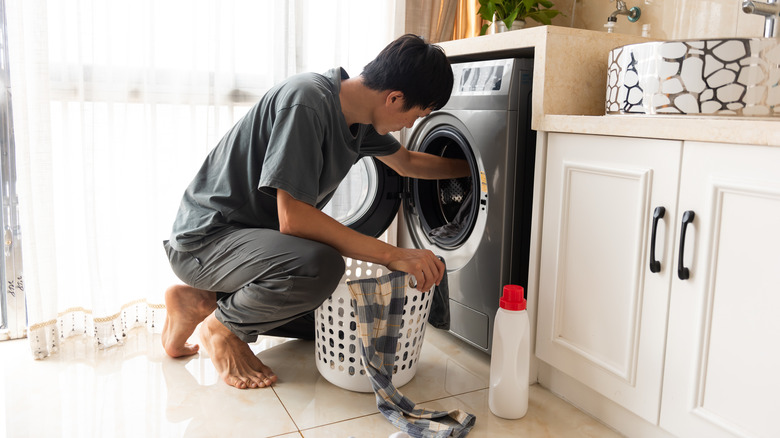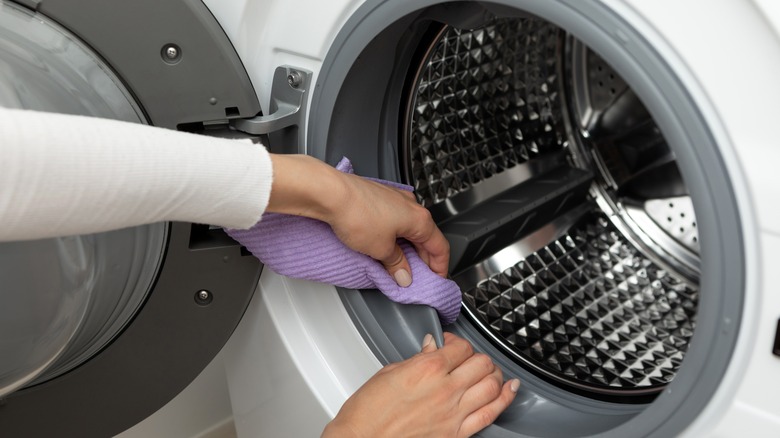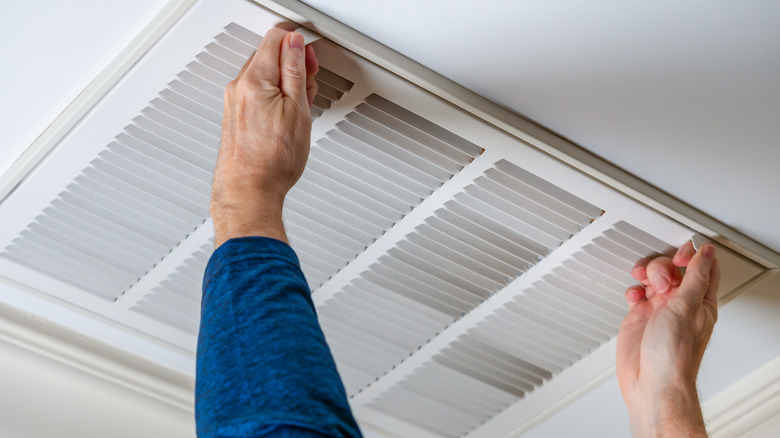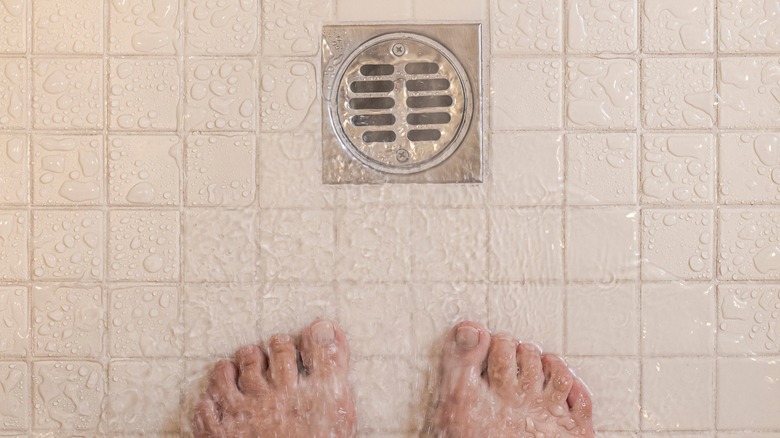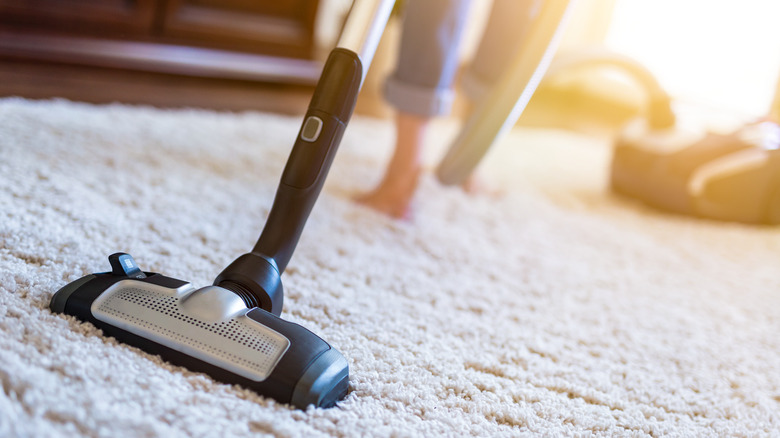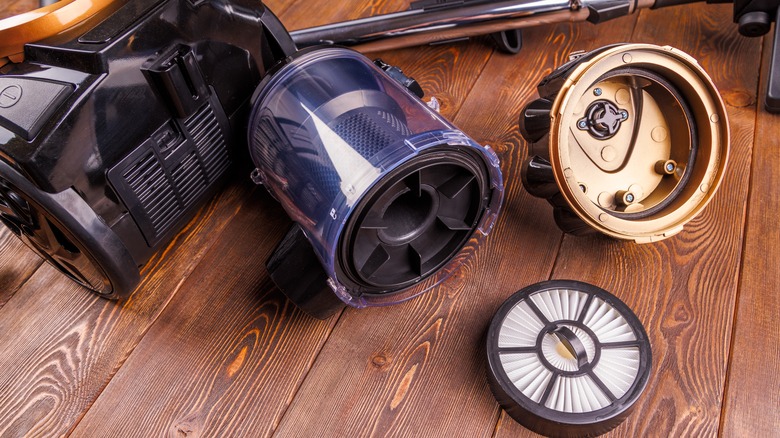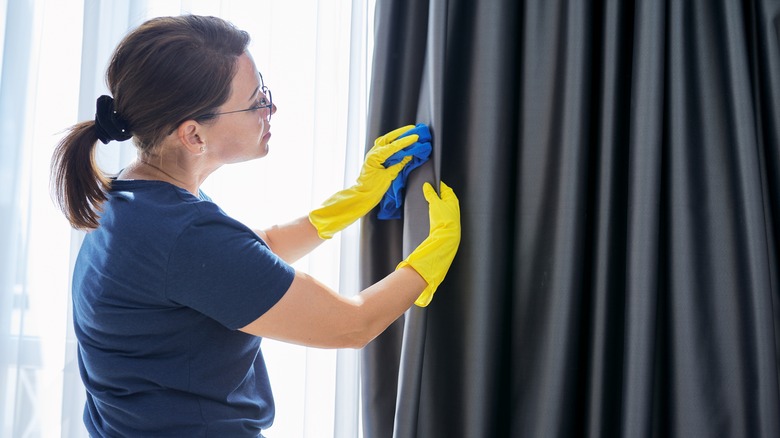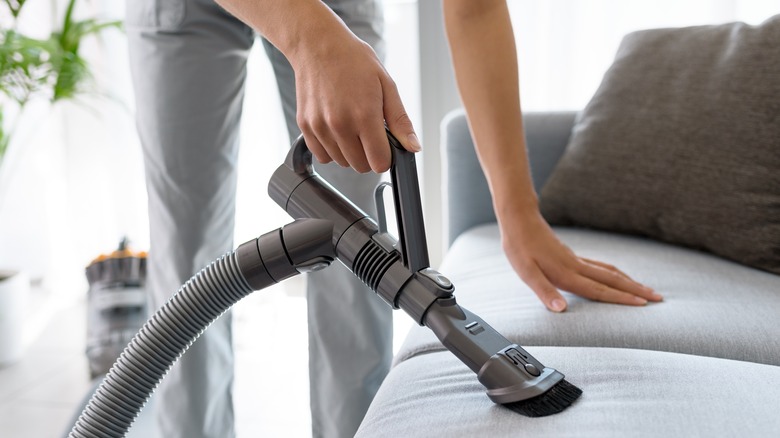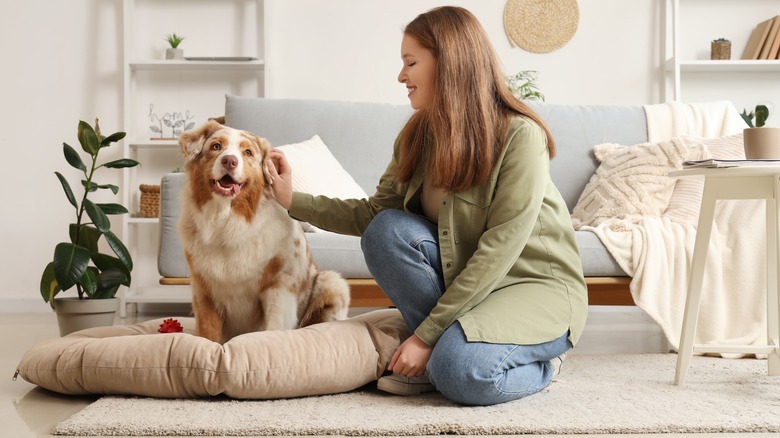Sneaky Spots In Your Home That Are Hiding Unwanted Odors
A clean-smelling home is often associated with a healthy one, which is why it's important to practice some small habits that make your home smell better. You may take out the trash daily, or perhaps you run the air purifier all day long. However, even with your best efforts, odors can still crop up. Whether you have long-adhered to a cleaning schedule, or are in the process of building new cleaning habits, the fact is that odors can be a challenge in any home.
If you've addressed some of the more obvious sources, such as your trash cans, garbage disposal, or refrigerator, consider some other spots that could be creating unwanted odors. Some of these non-conspicuous places could be lurking in certain areas of your bedroom and bathroom, or even in high-traffic areas like your living room. You can be on your way to a cleaner-smelling (and healthier) home by checking in on some of these sneakier spots that could be creating unwanted odors. On top of this, any "musty" odor could be a sign of dangerous growths that require immediate attention, such as mold.
Smelly laundry areas could indicate growths in your washing machine
Laundry rooms typically smell like any scented detergents and fabric softeners you might use. However, if the area has a musty odor to it, there's a chance that mildew or mold has built up in your washing machine. Another sign of this is problem is when your clothing, towels, or linens don't smell clean like they used to. Common places of mold and mildew buildup include the rubber gasket in front-loading machines, as well as leftover water throughout the rest of the machine.
If your washing machine smells, you can fix it with the help of DIY cleaning solutions. For example, mild smells may clear up by running a hot water cycle in your washing machine. (This is also good to do at least once per month.) You can also run white vinegar through the machine, or spray a combination of water and vinegar as a green cleaning agent to scrub it clean. Vinegar itself is naturally acidic, and can help break down hard water scale and other alkaline materials that can build up in washing machines. If these methods fail to make your washing machine smell cleaner, you may need to resort to commercial products.
Air conditioner vents can harbor odors for a variety of reasons
If you're noticing a sweet smell coming from your air conditioner vents, or any other unusual smell, this should be cause for immediate action. While you might assume that the vents themselves need cleaning, there could be other problems at hand. The exact issue varies based on the type of smell. For example, a sweet or dirty sock-like smell might indicate mildew or mold growth, while rotten food or garbage-like odors could come from a cracked sewage pipe or a dead rodent. Burning smells could indicate a serious mechanical issue, while sulfur-like smells may point to mechanical or drywall problems.
Tracing any odd smells in your home to your air conditioning vents may require calling a professional for help. Any mechanical or electrical issues should be addressed by a professional. The same goes for possible problems with pests in your attic and ductwork. However, you may be able to address musty smells and prevent future odors of this nature with regular cleanings. Clean or change your filters every few months, and consider placing small bowls of baking soda in your ducts to help absorb moisture and neutralize odors on a continuous basis.
A consistently smelly bathroom could indicate problems with your shower drain
If your bathroom smells strange, and you can't identify the source, consider whether the offensive odor is coming from your shower drain. Odors from this area may indicate a small clog. Slower-than-normal water drainage while bathing could also confirm this problem. As organic debris sits in the drain, it eventually begins to breakdown and emit a smell.
It's important to clear any possible clog so it doesn't become a larger problem. However, you don't have to rely on commercial chemical products for the job. To save money and avoid potentially toxic products, consider running a baking soda and vinegar clog-clearing recipe instead. This works by creating a carbon dioxide gas reaction that loosens debris when they are mixed together. First, pour ½ cup of baking soda directly down the drain, and then pour 1 cup white vinegar. Let the combination work its magic for several minutes before following it up with boiling water. You can repeat the process if necessary, and also use once a week for regular shower drain maintenance to prevent future clogs. If you're still having issues, and if your shower drain smells like sewage, consider purchasing a drain snake to manually remove the clog. If that doesn't solve the problem, it may be time to call a plumber.
Carpets can hold on to odors despite regular vacuuming
Even if you vacuum your carpets the correct way on a regular basis, they can still hold odors. That's because dirt, body oils, and food crumbs can sometimes get pushed down to the backing, which vacuum beaters have a difficult time getting into. Because of this, even if dirt, dust, and hair are swept up on a regular basis, musty smells may build up over time. You may be able to tell your carpet smells a bit unusual if it's affecting only certain areas of your home and not others (such as those with wood, laminate, or tile flooring).
Before you go out and buy perfume-laden carpet fresheners though, consider eliminating odors with the help of baking soda instead. Most unpleasant smells are either acidic or basic in nature, and baking soda's active ingredient — sodium bicarbonate — is alkaline. This means it can effectively neutralize these odors. When an acid reacts with a base, they cancel each other out. The volatile molecule that causes the odor is transformed into salt during this reaction, and since salt is odorless, the smell disappears. To use baking soda as a carpet deodorizer, simply sprinkle over your carpeting and leave it on for at least 15 minutes, and up to several hours. Vacuum it up thoroughly, and repeat the process if desired.
Your bagless vacuum cleaner may be holding on to odors
Bagless vacuums have arguably been game-changers in both the ease of use and the cost of running this essential home appliance. While you may empty the bin without a second thought, it could ironically be one of the items smelling up your utility closet. Over time, dust, dirt, food particles, and pet hair get trapped in the device. This can contribute to offensive odors, making your vacuum cleaner not so clean.
When considering the best ways to get rid of smelly vacuum cleaner odors, know that while it's important to empty the bin and clean attachments regularly, you'll want to do a deep cleaning at least once per year. Not only will this help get rid of odors, but you may even extend the life of the device, too. For a deep cleaning, first take your vacuum cleaner outside and put on a face mask. Take the bin and any attachments off the device, and blast away left-behind debris with a can of compressed air. You can also take a damp cloth and wipe out any stuck-on grime. If the brush head is clogged you may need to take scissors and cut off tangles of hair. If you use water on any portions of the vacuum cleaner, allow these to air dry for 24 hours before putting the vacuum back together.
Musty smells may be lurking in your closet
If your bedroom smells "off" despite cleaning the floors and washing your bedding, you may want to investigate the closet. Musty odors can build up in wardrobes due to a lack of air circulation in this smaller space. Another possibility is putting back clothes that have been worn but not washed. In extreme cases, it can also indicate mildew or mold growth on clothing.
If you don't notice any mildew growth, you may need to simply deodorize the closet space. As mentioned above, baking soda is a great tool to neutralize acidic odors. However, when it comes to the wardrobe, you might have more success if you place a bowl of vinegar in your closet. That's because vinegar does the same thing to alkaline odors that baking soda does to acidic ones — it neutralizes them. While musty odors like sweat can start acidic, they can turn alkaline as they dry on clothes. That's because bacteria break them down and create alkaline byproducts, such as ammonia. In cases like those, you will have greater success with vinegar than baking soda. However, since sweat can be both alkaline and acidic at different points in time, you might want to consider leaving both bowls out.
However, if your issue is mildew, you're better off reaching for lemons. Before resorting to harsh bleach, try using salt and lemon juice on mildew spots and allow the affected clothing to dry in the sun before rinsing the solution off with water and running it in the washing machine. The salt can act as an abrasive to scrub away stains, while the acidity in lemon juice can neutralize the alkaline environment that mildew needs to grow. If the environment turns acidic, it will die back.
Curtains can retain odors throughout your home
Any smells in the air from cooking and other aspects of everyday living can potentially be absorbed by curtains and blinds in your home, and any dampness can make them smell, too. Depending on the cause of the odor, you might notice a musty smell due to mildew or mold, or those associated with pets, smoke, or food.
In some cases, depending on the product label, you may be able to clean curtains in the washing machine. If you cannot clean them in this manner, you may still want to hold off on using unnecessary chemical sprays. Instead, you may be able to get rid of that funky smell from your curtains with common household ingredients. One example is white vinegar and water. Combine 3 tablespoons of vinegar with 1 quart of water in a spray bottle. As mentioned, vinegar is an acid that can help break down alkaline odors, such as sweat, pet odors, and fishy food smells.
Couch cushions can grow stinky over time
If you've cleaned and deodorized your curtains and living room rug but still smell offensive odors, you might want to consider the furniture you sit on. It's important to clean your sofa often, especially if it's used regularly. Couch cushions, especially fabric versions, may also hold odors and require occasional cleaning to get them smelling fresh.
To clean couch cushions without resorting to chemicals that might potentially damage your furniture, you'll first want to look at the furniture tags, which contain cleaning codes for guidance. A "W" designation, for example, means that you can only spot clean them with a mild detergent, while an "S" means you need to use solvents. An "X" indicates that you cannot use any liquids at all. If the tag has both "S" and "W," this means you can use either water or a solvent for spot cleaning. You can also deodorize couch cushions with the same baking soda trick we recommended above for carpeting. This pantry item can help neutralize odors from daily use of your furniture, as well as those related to pets and food spills. Simply sprinkle it onto one side of the couch cushion at a time and allow at least 15 minutes to pass before vacuuming. If that clears up most of the odor but not all of it, try using a vinegar spray next to cancel out any alkaline smells. You can also help extend the life of your couch cushions and prevent future odors by vacuuming them once a week.
Pet beds may also contribute to unwanted home odors
Bathing and grooming your pets can help keep both them and your home clean. Despite these efforts though, your furry companions may be contributing to home odors indirectly due to the beds they rest or sleep on. As with other fabric-based items on this list, pet beds can trap odors and subsequently make your home smell.
The safest and most effective way to clean pet beds and sheets is by tossing them in the washing machine. In some cases, you may need to remove and launder the outer layer of the bed, and then spot clean the interior mattress. In terms of how often you need to clean your dog beds, you may wash the items as often as needed, with weekly cleanings considered the bare minimum to help keep things smelling fresh. If you need to quickly deodorize pet beds in between washes, you can sprinkle them with baking soda and vacuum after 15 minutes to help neutralize their odors.
